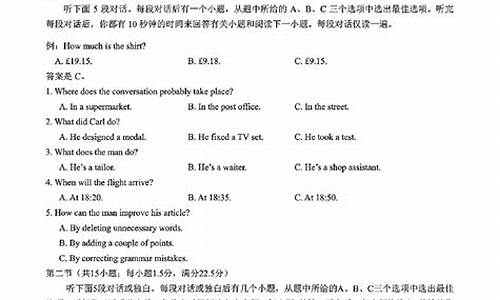您现在的位置是: 首页 > 教育改革 教育改革
听力高考原文_听力高考原卷
tamoadmin 2024-06-13 人已围观
简介1.辽宁省高考英语考听力吗 全国二卷1.W: Hello, may I help you?M: Yes, we would like to check into our room.2.W: Come on, John! Relax! What can go wrong?M: At my first job interview? Plenty3.M: Good morning, madam, wha
1.辽宁省高考英语考听力吗 全国二卷

1.W: Hello, may I help you?
M: Yes, we would like to check into our room.
2.W: Come on, John! Relax! What can go wrong?
M: At my first job interview? Plenty
3.M: Good morning, madam, what can I do for you?
W: Well, someone at the hotel suggested I come here to buy a coat.
4.W: I gave Dave 300 dollars for his sponsored concert.
M: 300 dollars? Sandy, you must be mad! I wish I had 300 dollars to throw round like that.
5.M: Shall I come and take you to the railway station?
W: No, thanks, I’ll manage. It’s not far any way.
6. W: How many children have you got?
M: Two. John’s five and Clair’s four. And there’s another one on the way.
7. W: Do you know how I can stop drinking too much coffee?
M: No, but I wish I did. I spend too much money at cafe’s.
8. W: Could you give me a hand moving this cupboard, please?
M: Well, I’d rather not if you don’t mind. I’m not feeling well today.
9. M: Tom’ s house is a mess! Doesn’t he ever clean it?
W: I guess he just has too much ails on his mind with that new job
10.M: I didn’t have any trouble in finding accommodation in Britain.
W: According to my experience, it sounds too good to be true.
passage 1:
Well, I own a small data processing company, in which I employ about eight to ten workers. And the point I want to make has to do with trust. I know it’s possible to force people to be 100% efficient. But I think when you do that, you lose confidence and trust. I let my employees use our equipment and make personal phone calls. They are more than welcome to decide what is right and wrong. Because I think you can’t run a company by just giving orders to robots and watching them like big brother, right? I think you have to trust people and give them a little freedom. And also, as far as phone calls and all that go, I want my people to call home and check on their children and know their children are safe and sound. As a result, I have devoted employees who are willing to go that extra mile and I can honestly say they show up to work smiling. So I get more satisfaction and rewards by trusting my employees than by suspecting them of doing something wrong.
Passage 2
Questions14-16 are based on the following passage:
The roots of Canadian English can be found in the events which followed the American revolution of 1776. Those who had supported Britain found themselves unable to stay in the new United States, and most went to Canada. They were soon followed by many thousands who were attracted by the cheapness of land. Within 50 years, the population of upper Canada had reached 100 thousand, mainly people from the United States. In the east, the Atlantic provinces had been settled by English speakers as early as the 15th century, but even today, these areas contain less than ten per cent of the population, so that they have only a limited role in the development of Canadian English. In Quebec, the majority of people use French as a mother tone. Here English and French exist together but uneasily. Because of its origins, Canadian English has a great deal in common with the rest of the English spoken in North America, and is often difficult to distinguish for people who live outside the region. To British people, Canadians may sound American; to Americans, they may sound British. Canadians themselves insist on not being identified with either, and certainly, there is a great deal of evidence in support of this view.
section C
Directions: in Section C, you will hear two longer conversations. The conversations will be read twice. After you hear each conversation, you are required to fill in the numbered blanks with the information you have heard. Write your answers on your answer sheet.
Blanks 17-20 are based on the following conversation:
A: Good morning, Leeds University students registration center.
B: Good morning, I need to register for a class.
A: OK. May I take your name, please?
B: Sure, it’s Andrew Smith.
A: Which department do you study with?
B: The history department.
A: May I have your student ID?
B: HD3309.
A: What class are you trying to take?
B: I want to take a photography class.
A: Well, there’re only two classes open.
B: Can you tell me what days the classes are on?
A: One is on Tuesday, from 2 pm. to 4 pm.
B: And the other?
A: From 10:00 to 12:00 on Thursday.
B: OK, sign me up for the class on Tuesday.
A: Very well, then.
Complete the form. Write one word for each answer.
Blanks 21-24 are based on the following conversation:
A: Welcome to our program, Anny. Please tell our audience the best things about the experiment in international living.
B: Well, my group was great! And I love my host family.
A: Can you tell us about your group?
B: Well, we were all high school students from the US. But we were very different.
A: You mean from different cities, with different religions and cultures?
B: Yes, and I was existed about that. We learnt that we weren’t really so different.
A: What do you mean?
B: Well, we became such good friends. More than friends, we were like a family.
A: Wonderful. I’d like to know more about your host family.
B: Oh, I loved my host family in Costa Rica. They were my family, too. I felt like I was their daughter.
A: So nice! Did you have any problems speaking with them?
B: No, not really. Actually, I learnt a lot of Spanish from them. And I also learnt that language is not always so important.
A: What do you mean?
B: Well, in some cases, a simple smile can say more than words.
A: Thanks so much, Anny.
Complete the form. Write no more than 3 words for each answer.
辽宁省高考英语考听力吗 全国二卷
山东省2022年高考外语听力考试是在1月8日,?考生有两次考试机会,两次听力考试间隔约20分钟,考试时间为9: 00开始,11:00前结束。考试成绩取两次中的高分计入外语科目成绩。
我省2020届2021届高考外语听力都是在1月8日考的,不出意外,2022届高考生(2019级高三)也会在这个时间段考外语听力。
听前:略读题目,切入话题,划出重点,预测内容(确定人物身份)。
听中:捕捉信息,速记要点,有的放矢,去伪存真(短文独白,首末为主旨句,注意5W,1H)when,where,what,who,why,how。
听后:连贯记忆,前后联系,综合考虑,一锤定音。
考场主要技巧
1、掌握命题规律,捕捉有用信息。
一般来说,英语听力测试主要是获取事实性的具体信息,这些问题大多以when,where,who,what,why and how等疑问词的形式出现。该部分主要包括某事件的细节、数字与计算(时间、价格等)、地点与方向、身份与职业、计划与打算等。
这些细节的考查往往以简短对话的形式出现,即两人之间“一问一答式”的谈话。由于这类对话长度较短,往往只播放一遍。这就要求考生在解题时,应特别注意倾听第二个人的答语,以便从中捕捉到答题所需的信息。
2、调整心情,确定测试主题
很多考生由于缺乏语言环境,对听说能力训练不够充分,容易产生心理紧张等情绪。这时考生可做做深呼吸,放松心情,使自己处于最佳心理状态。如果某一句话听不明白,暂时放弃,以免影响后面的答题。
听力测试的每段对话或讲话的考点都要集中在一些主要信息和重要细节上。
考生应该在时间运用方面有超前意识,充分利用有限时间扫视或快速浏览试卷上的问题以及选项,先对材料背景进行了解。然后再有的放矢地听,这样事后就可以集中主要精力去捕捉问题所涉及的有关信息。
辽宁省高考英语考听力是全国二卷,但除了选择英语相关专业的考生,其他考生可以不考英语听力。
辽宁省外语科目听力部分考试满分为30分,听力部分考试得分不计入高考成绩,录取时提供给有关高校。
外语科目成绩计算方法为:外语科目得分去掉听力部分得分乘以150/120后,按照四舍五入的原则取整。
扩展资料:
新课标全国卷分为Ⅰ卷、Ⅱ卷、Ⅲ卷。并且从2016年开始,全国Ⅰ、Ⅱ、Ⅲ卷分别改称为全国乙、甲、丙卷。小语种(日语/俄语/法语/德语/西班牙语)高考统一使用全国卷,各省均无自主命题权,且不分甲、乙、丙卷。
《高考听力》部分是整套高考英语试卷中最简单的部分,是拿分点。有时不单单考察你的英语听力水平,同时还会考察你临场应变能力、猜题能力、记忆能力等等。目前已有多数省份取消此项考试。









